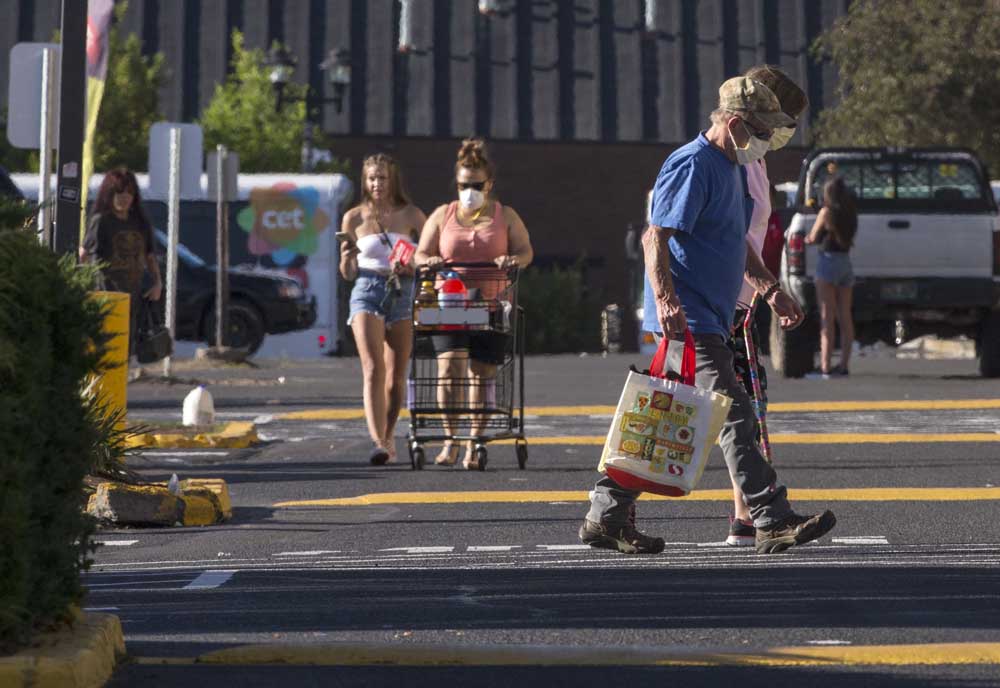Locals reflect on pandemic after federal government declared its end
Published 5:30 pm Thursday, May 11, 2023

- Shoppers wear face masks to guard against COVID-19 as they walk through the parking lot in June 2020 at Safeway at 642 NE Third St. in Bend.
It may have seemed anti-climactic, given the fading woes of the COVID-19 pandemic, but Thursday marked the official end of the public health emergency.
The Biden administration had allowed the pandemic’s classification as a public health emergency to expire, more than three years after the virus began its fatal march through cities and towns around the world. The end of the crisis found Central Oregon residents out and about on a warm and sunny day — many without masks.
Cynthia Stedfield of Redmond was strolling downtown. She said she thinks about the seclusion she faced as a single woman during the widespread lockdowns when the pandemic began in 2020.
“It (the pandemic) sparked me to move to Oregon from California — because I was incredibly depressed and wanted to change my life and the only thing I could do was move. So, it took time to do all that, and it filled my time. I moved to Oregon. … I love it,” Stedfield said.
Stedfield said the virus that causes COVID-19, in her mind, has become similar to the flu, a disease people should get vaccinated for each year. She’s also tired of the way people react at the mention of COVID-19 and when they exhibit a symptom that may be unrelated and people freak out.
“Any time someone is around you and they sneeze and they cough, we are so paranoid now,” Stedfield said. “And people used to sneeze and cough around you all the time.”
Mike Baxter, 58, of Bend, has been a fire and emergency medical services first responder for 37 years. During the onset of the COVID-19 pandemic, he was on an engine company responding to calls.
“I think at the beginning of COVID, we were overreacting a little bit. But we didn’t know. You don’t know what you don’t know so you take every precaution you can to stop it,” he said.
Baxter said in the beginning nearly anybody who was feeling sick was coded as a possible COVID patient, reminding him of when he worked as a paramedic during the AIDS epidemic. In retrospect, Baxter said the pandemic has caused him to make some changes in his habits.
“I brought some things with me from this whole thing,” Baxter said. “I carry hand cleaner in my car. Now when I come out of a business I automatically clean my hands in the car if I can’t wash my hands. That is part of my normal life now. And I carry masks in my car now just in case.”
Chris Hardy, 55, and David Boorstein, 65, both of Bend, were hanging out in the sun at the Old Mill District.
“I don’t want to forget that I went through it and learned the lessons of what happened to society and how I responded to it. But as far as concern about getting sick again, I have no concern. The virus did what it was supposed to do. It weakened and is not killing people as it was, in most cases,” said Boorstein, who works in the health care field. Hardy said he misses the intimacy he had with his family and a small group of friends during the pandemic and that it has been difficult for him socially to adapt to being around lots of people again.
Judith Gwynn of Bend said what she remembers most about the pandemic was sitting around her house a lot. Fortunately, she said she was able to have outdoor, socially distanced happy hours with her neighbors, which helped her pass the time in lockdown.
She said she always carried her mask with her and wore it when she had to even though she did not like how it felt. The pandemic also left a lasting impression on her with some new habits.
“We have sanitizer in the laundry room when we come in, and we always wash our hands when we come home from shopping. And if we are shopping and we stop to eat someplace, I always go to the restroom first and wash my hands,” Gwynn said.
Gwynn said she will get her COVID-19 shot every year, just like she gets her flu or pneumonia shot, and said she doesn’t have a problem with that.
When it comes to the official end of the pandemic, she said it was about time.
“I think it is about time to stop,” she said. “People are tired of it … so, I don’t have a problem with the government saying it is over.”








